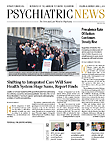Clozapine Liquid Formulation Available in U.S.
Earlier this year, Jazz Pharmaceutical released the United States’ first available oral suspension of clozapine, Versacloz, intended for individuals with treatment-resistant schizophrenia or schizophrenia patients with recurrent suicidal behaviors.
The liquid version of the atypical antipsychotic is a tasteless formulation that can be administered in outpatient settings under the supervision of a health care professional. According to the company, the new version of clozapine will help eliminate “mixing” and “matching” of pill dosage and may reduce the possibility of cheeking medication by patients.
Efficacy for Versacloz in patients with treatment-resistant schizophrenia was determined through a six-week, active-controlled study, while efficacy in reducing recurrent suicidal behaviors in patients with schizophrenia or schizoaffective disorder was determined through a two-year treatment trial.
Because of the risk of agranulocytosis, Versacloz will be available only through the Versacloz Patient Registry to ensure appropriate monitoring of white blood cell counts.
Pharma Reduces Funds For Promotional Speeches by Clinicians
A new analysis by ProPublica shows that payments to U.S. health care professionals for product promotional speeches are declining.
The analysis evaluated data from 2009 to 2012 of 15 pharmaceutical companies that disclosed—mostly because of legal settlements—expenditures for physician-led promotional speeches.
The analysis showed that major manufacturers, such as Eli Lilly, had reduced physician-associated speaking expenditures by 55 percent in one year, from $47.9 million in 2011 to $21.6 million in 2012. Pfizer’s physician-based speaking engagement expenditures also fell—from $22 million to $8.3 million—within the same period, while AstraZeneca’s remained the same. Johnson and Johnson, however, increased payments to physician speakers by 17 percent during the period.
ProPublica, an independent, nonprofit news organization that produces investigative public-interest journalism, has been tracking publically reported payments by drugmakers as part of its Dollars for Docs project since 2010. The Dollars for Docs database lists names of all physicians who have received compensation from the drug companies that make such information available.
Information about “Dollars for Docs” can be accessed
here.
FDA Approves Abilify in Extended-Release Form
Otsuka Pharmaceutical and Lundeck have announced that the Food and Drug Administration (FDA) has approved Abilify Maintena (aripiprazole) as a once-monthly injectable dopamine partial agonist indicated for schizophrenia.
In a year-long randomized, controlled trial with nearly 400 adult patients with schizophrenia, Abilify Maintena significantly delayed time to relapse compared with placebo. In addition, rates of relapse in patients given the medication were four times lower than those of the placebo group.
Abilify Maintena is not approved for the treatment of patients with dementia-related psychosis and is contraindicated in patients with a known hypersensitivity reaction to aripiprazole.
Teva to Pay Millions for False-Billing Allegations
On March 11, the Department of Justice (DoJ) announced that Teva Pharmaceuticals and its subsidiary, IVAX, agreed to pay the federal government and the state of Illinois $27.6 million for allegedly violating the False Claims Act by making payments to increase prescriptions written for an antipsychotic to Medicare and Medicaid beneficiaries.
The settlement resolves allegations that Teva and IVAX made payments to Illinois physician Michael Reinstein, M.D., to generate prescriptions for a generic form of the antipsychotic drug clozapine. The DoJ alleged that in 2003, IVAX agreed to pay Reinstein $50,000 under a one-year “consultant agreement” plus benefits—violating the federal Medicare and Medicaid Anti-Kickback Statute. According to the government, Reinstein quickly became the “largest prescriber of generic clozapine in the country and prescribed the drug for many elderly patients.” The payments and other forms of remuneration from IVAX and Teva allegedly continued for many years, which resulted in thousands of false claims to the Medicare Part D and Illinois Medicaid programs.
The DoJ stated that the “claims resolved by this settlement are allegations only, and there has been no determination of liability.”
Anxiolytics and Hypnotics Linked With Increased Mortality Risk
Researchers at Warwick Medical School in the United Kingdom led a study assessing rates of mortality associated with antianxiety and sleeping medication. The study compared 37,727 patients who had a prescription for anxiolytic or hypnotic drugs with 69,418 patients with no prescription for such medications. Patients were tracked for an average of 7.6 years.
The results, published in the British Medical Journal, showed that compared with control subjects, patients with prescriptions for antianxiety and sleeping medications were twice as likely to die prematurely.
Daniel Buysse, M.D., a sleeping disorder expert and professor of psychiatry at the University of Pittsburgh School of Medicine, told Psychiatric News that though hypnotic drugs have been found to be “statistically associated with increased mortality risk, . . . retrospective cohort studies cannot completely control for potential confounds, such as severity of illness and multiple comorbidities.” Buysee emphasized that psychiatrists, along with their patients, should carefully consider the pros and cons before prescribing such medications and should monitor side effects regularly once the patient begins taking the medication. ■
Weich S, Pearce H, Croft P, et al. “Effect of Anxiolytic and Hypnotic Drug Prescriptions on Mortality Hazards: Retrospective Cohort Study.” 2014.
BMJ. Mar 19 [Epub ahead of print]. Available
here.

